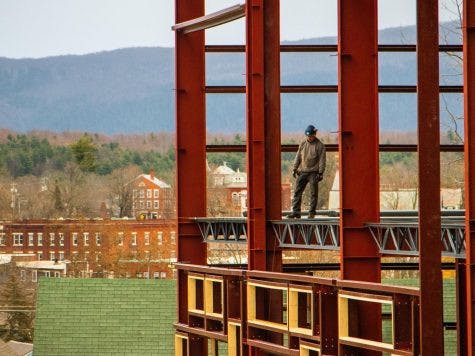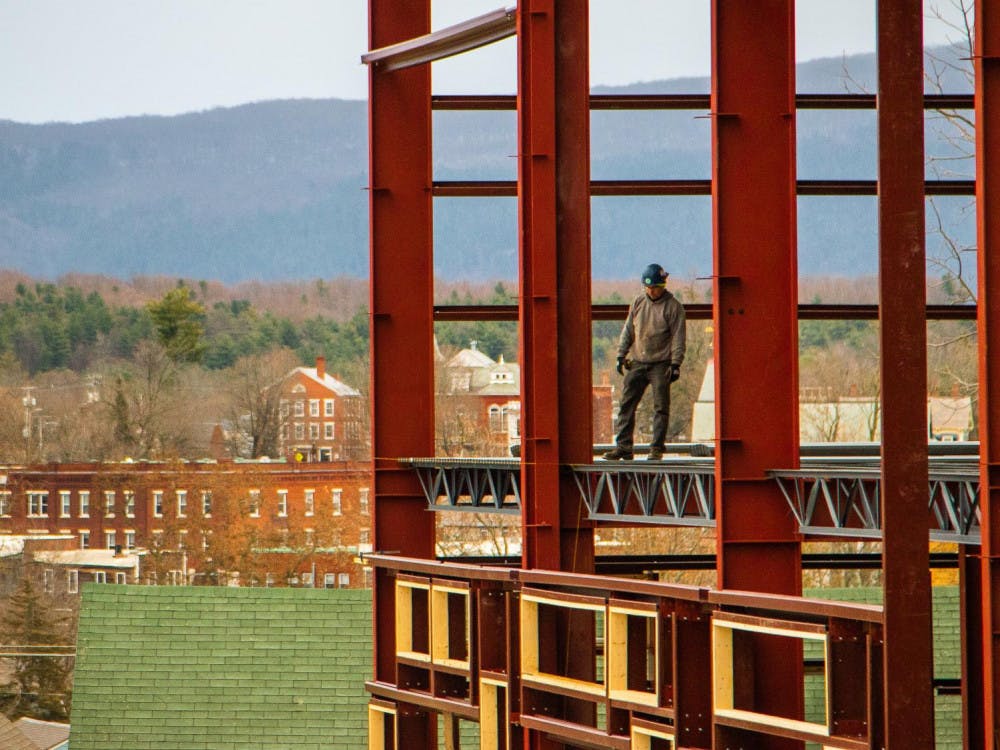As Professor of Computer Science Daniel Scharstein sees it, writing a computer program requires just as much intellectual creativity as writing an English essay or proving a mathematical theorem.
When Scharstein first encountered the discipline as a teenager, “that was the thing that blew me away,” he said. “You have this power — you have this computer that does your bidding.”
“You can concoct whatever you want,” he said.
With boundary-pushing innovations in computer science filling headlines every day, the role of computer science (CS) as a means of bringing about change seems both exciting and endless. And at Middlebury, surging interest in the discipline has caused the department to grow rapidly, and prompted the institution to begin remaking the campus to accommodate it.
On Middlebury’s campus, there are around 160 declared CS majors. This statistic is even more impressive when compared to the previous decade when there was an average of seven graduating CS majors per year. This ranks CS as the second-largest major on campus, after Economics.
Course enrollment has grown tremendously, too. A decade ago, the computer science faculty taught an average of 210 students per year. This past year’s total enrollment rose to over 1000 students, with an additional rise to about 1150 expected by 2020.
Middlebury students and faculty have designed complex computer programs capable of drawing and animating pictures on the screen, solving computational puzzles and detecting dangerous and abnormal crowd behavior using computer vision techniques. But Middlebury faculty also emphasize the basics — Scharstein reasoned that, far from being a vocational field of study, computing is a basic skill, just like reading, writing and arithmetic.
“I honestly think everyone should take an intro to CS class,” said Aiko Hassett ’20, a computer science major. “Technology is becoming such a huge part of our daily lives,” Hassett observed, that simply knowing the basics of computer science can help one gain “some fresh creative insights” and a better understanding of how our society works.
“[Programming] trains your brain in another way of thinking,” Scharstein said. “You learn how to put lines together that put these computations together for you. [Computing] teaches you precision — one missing semicolon and your code won’t run,” he said. “But it’s also an art.” A single code could be written in a hundred different ways, each resulting in a different solution with its own unique pros and cons.
“Coding, for me, is like a completely new language,” said Emely Zeledon ’20. “When I approach a problem, I have to first stop and plan out every single step that I'll have to take to get to the final solution. You have to be methodical yet concise and that's a skill that is valuable in many careers.”
A Molecular Biology and Biochemistry major, Zeledon noted that CS is integral in the field of molecular biology and biochemistry, as it is in many others, because of “its ability to make algorithms, predict patterns and [organize and interpret] data.”
Professor Matthew Dickerson, who has taught in the CS department at Middlebury for almost 30 years, echoed this view.
“[Computing] doesn’t just mean sitting in front of a terminal writing computer programs,” he said.
Students of CS are discovering an exciting field with computational aspects that extend into not only the sciences, but also art, music, history and economics, Dickerson explained.
The data supports this observation, too. In the Fall 2017 Student Profile released by Middlebury’s Office of Assessment and Institutional Research, more than a third of the 101 declared computer science majors also double-majored in another discipline.
Thea Bean ’19 took one of the department’s introductory courses, Computing for the Sciences, because she wanted to become a more well-rounded scientist. She believes that her background in both biology and coding was what had helped her get a job this past summer.
With larger enrollments, however, come changes in dynamics both in the classroom and in the department. In introductory classes, for example, faculty are tasked with accommodating students with vastly different levels of CS experience. Some have taken advanced computing courses in high school, while others have next to no prior exposure to the field.
“The professors somewhat struggled to teach in a way that challenged every level,” Bean said.
Compared to students with previous knowledge and experience in CS, for whom the introductory classes may be only mildly difficult, students without background in the field can find the introductory classes to be quite challenging.
“Success in the class can depend on the student's ability to attend office hours as well as T.A hours,” said Zeledon, citing a common problem faced by students whose packed class and extracurricular schedules get in the way of seeking help outside of the classroom.
Zeledon felt that the level of difficulty in introductory computer science courses has “increased in comparison to past semesters as a function of the spiked interest in CS majors,” reflecting that taking a CS course helped her “feel more comfortable with failure being part of the journey to success.”
The department now has eight full-time faculty on campus, with three joining the team in the past academic year. Even with three new tenure-track lines granted in the last two years, however, the computer science department remains severely short-staffed.
Middlebury’s average faculty to student ratio is one to eight. With more than 1000 students enrolled in CS classes last year and only eight full-time professors on campus to teach those classes, the faculty to student ratio for the CS department is higher than one to 50. Naturally, the department is currently searching for its 11th full-time faculty member.
“We want to serve all the students,” Dickerson said. “But it’s hard with that many students.”
“It’s harder for me to get to know the names of students when there are 30 of them instead of 12,” he admitted. “In a bigger class, there may be students who feel less comfortable asking questions. [During office hours,] if there are 10 students waiting in line for help, one student might not get as much individual help or attention.”
The department employs a full-time Assistant in Instruction, Ruben Gilbert, to aid students — a system that imitates the teaching assistant model commonly found at larger research universities. According to Bean, Gilbert’s help was crucial to her success in the class. “I learned most of what I know from Ruben,” she said.
A larger faculty brings the possibility of offering more electives, and larger student enrollment brings energy to the CS scene at Middlebury, Dickerson said. However, he noted, “it’s easier to create energy when you have a lot of people but harder to create community.”
Student organizations such as Middle Endian and wiCS++, as well as summer research experiences and group projects in classes help build community, Dickerson explained. Middle Endian, whose name is a play on the concept of endianness, the order in which numbers are stored in bytes, aims to foster a sense of community within CS at Middlebury. wiCS++, which stands for women in computer science, aims to create a culture and space for historically underrepresented groups in the field.
The percentage of women CS majors at Middlebury wavers at around 33 percent. Hassett said that the gender distribution in the CS department was better than she originally thought, but noted that “as a woman in STEM, and especially CS, it’s so easy to feel doubtful of your ability,” calling for a community of “females who support, encourage and inspire one another.”
“TIGHT FOR SPACE”

The department’s growth was a major factor behind the construction of the new transitional building on the south side of the parking lot behind Wright Memorial Theater. The new building, expected to be completed in June 2019, will house the CS department and provide office space for other departments, giving the CS department more room to grow and freeing up much-needed lab area for other science departments in McCardell Bicentennial Hall.
“There’s a certain exciting event energy in Bihall,” said Dickerson, but “we are tight for space up there.”
It turns out, however, that this move might bring a couple drawbacks of its own.
“It’ll be a huge blow, as far as I’m concerned,” said Professor of Biology Jeremy Ward of the anticipated relocation.
For Ward, the physical presence of the computer science department in Bihall fosters collaboration between the scientific disciplines.
“I’m not going to see Michael in the elevator again,” he said, referring to Professor Michael Linderman, whose research in genomics overlaps with Ward’s. “Computer science is now fully integrated into every science discipline — I couldn’t do any of the work I do now without computer science,” he said. “But there’s always email.”
Dickerson said he also regrets the move away from colleagues in the sciences. “I will miss the collaborations with other science disciplines and seeing students from other majors in Bihall,” he said. “It’s nice to walk up and down the stairs and see my colleagues in geology or chemistry, and I think it’s nice for students in computer science to interact with other students in other majors.”
A white paper report from the National Academy of Sciences in 2016 suggests that an increase in demand for graduates with quantitative skills is a possible reason for the increase in demand for CS majors.
According to data from the Center for Career and Internships, 11 percent of Middlebury students who graduated in 2017 pursued careers in technology.
“It’s not that there’s ten times as many students who are interested in computer science,” explained Dickerson. “You also get students who do computer science because they think it’ll get them employed.”
But the notion of learning for learning’s sake, a foundational principle of a liberal education, remains alive within the CS department. Dickerson noted that it is not unheard of for students to declare a CS major for practical reasons, only to discover a passion for the discipline further down the line
“I don’t judge their motivations,” Dickerson said. “I’m just here to teach whatever they want to learn.”




